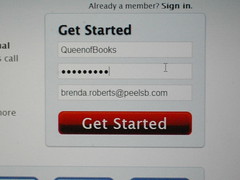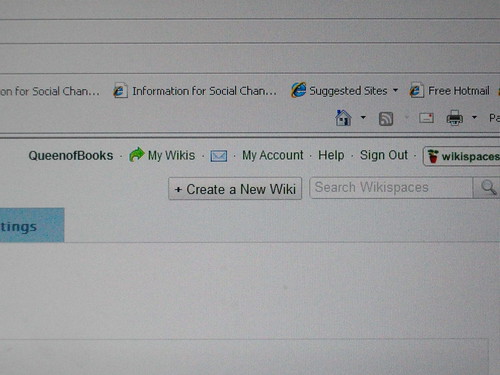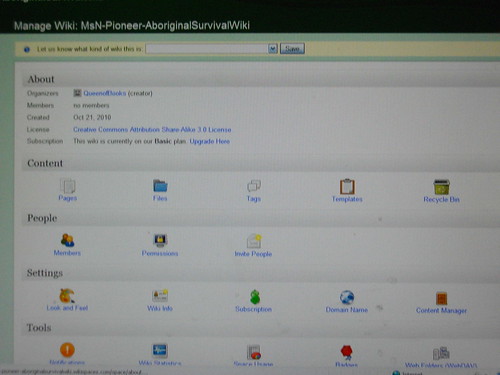 |
| "A wiki is like a party that doesn't have to stop. It's a party that doesn't get crowded because new rooms appear when needed. It's a timeless party where you can try each conversation over and over until you get it right." Cunningham, H. (Ward) G. |
Quick! What's a wiki?
The word wiki means "...quick, and it is perhaps the quickest way (along with a blog) to upload content to the World Wide Web," (de Ramirez, 2010, p. 29). Along with being quick, a wiki is easy to use. A wiki does not require contributors to know programming language. A wiki is easy to navigate. "A wiki is a website where anyone can edit anything anytime they want..." (Richardson, 2010, p.55). Wikipedia elaborates " a wiki is a website that allows the easy creation and editing of any number of interlinked web pages...often used to create collaborative wiki websites, to power community websites, for personal note taking, in corporate intranets' and in knowledge management systems". A great place to begin to understand how a wiki works is to view this video from Common Craft.
Wiki 101: Exploring this thing called wiki - just how does it work?
There are many sites that provide wikis. You can choose a free account or a paid account which offers more options. I've had some experience using pbworks (formerly pbwiki) and wetpaint. I'm quite satisfied with the features pbworks provides and it has certainly met my needs so far. For the purpose of this course I decided to take a look at Google sites and wikispaces.
I began with google sites and read through their overview as well as watching the brief tutorial video. The one advantage I see is the number of templates provided. Also, if you're using blogger for classroom blogs, the similar format will make it easy for students to navigate.
I moved on to wikispaces. I decided to simply try joining to see how their free sites compare to pbworks. If they have a similar easy to use format, I'll go ahead and begin setting up spaces for our current grade three inquiry, How did aboriginals and pioneers survive Canada's cold, long winters? Here's how to get started:
- Choose a site to host your wiki. (e.g. I'm trying wikispaces).
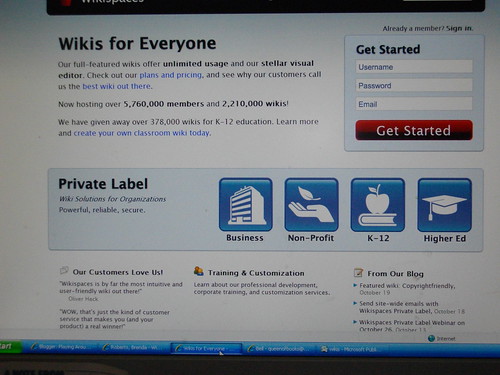
2. In the 'Get Started' area provide a username, password and e-mail address.
3. You will immediately be sent a welcome e-mail with a request to confirm your e-mail address. Once you’ve clicked on the confirmation link they automatically sign you in and
you are ready to begin making choices for your wiki. You will be taken to this page of tutorial choices. If you have never worked with a wiki before it is worth your time to click through each section and watch the videos provided in the help section.
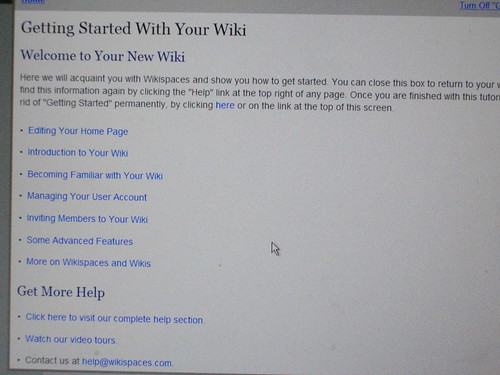
5. Now look at your dashboard. In the top right-hand corner is a box to click when you are ready to create a new wiki space.
6. First, choose a name for your wiki and add it to the box provided. This provides you with a URL for your site. Next choose your permission level, public (it's free and anyone can view and edit), protected (it's free and anyone can view, only members can edit) or private (free for the first 30 days, only members can view and edit). I chose protected.
7. Now you're ready to add content. Simply click on the 'edit' button.
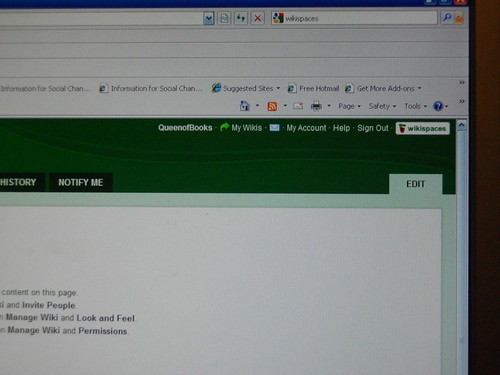
8. Begin entering the text that you would like to appear on this page. You can also embed images, videos and a variety of charts, graphs and presentations.
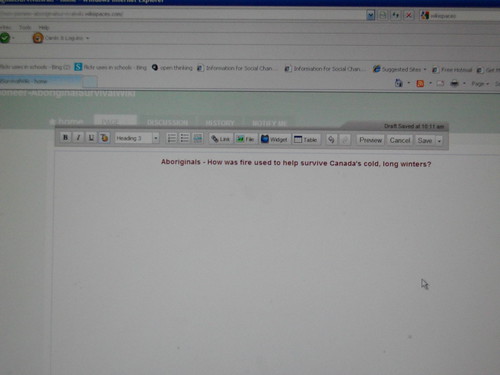
9. Now you're ready to 'manage' your wiki. You will be presented with the subheadings content, people, settings and tools. Their are icons under each subheading.
That Wicked Wikipedia!
7. Now you're ready to add content. Simply click on the 'edit' button.

8. Begin entering the text that you would like to appear on this page. You can also embed images, videos and a variety of charts, graphs and presentations.

9. Now you're ready to 'manage' your wiki. You will be presented with the subheadings content, people, settings and tools. Their are icons under each subheading.
The 'content' heading gives you quick access to the pages and folders on your wiki. You can access and edit the tags and templates used and you can see what has been put in the recycle bin. One of the first things you'll want to do is use the 'people' heading. This is where you invite others to take part in your wiki and decide what 'permissions' they will have, e.g. editor, writer, reader. Under 'settings' you may wish to alter the 'look and feel' a.k.a. the colour and style of your wiki. The 'tools' subheading gives you access to statistics about your wiki, e.g. how many views, edits, ...have taken place. For me, the most important tool is the notification tool. As Jakes, (2006) points out, "because they can be edited by anyone, wikis are subject to vandals - individuals posting inappropriate content that distracts from the purpose of the wiki page." Even when using a protected wiki students may post something inappropriate (and my experience each year has been that at least one out of each one hundred students do). By setting my notifications to alert me daily to all changes I can remove the questionable content and remove that student from the wiki.
Be prepared for daily e-mails from your host site, e.g. wikispaces, offering guidance as you set up your wiki.
How did it compare? I found wikispaces just as easy to use and pbworks. I liked their use of icons and felt their help section was superior. I couldn't however find a place to generate logins for students without providing individual e-mails. It's likely there but I'll likely need to shift back to pbworks until I figure this out.
That Wicked Wikipedia!
The best known wiki in the world is surely Wikipedia. I'll admit that like many others, when it first arrived on the scene, I didn't feel that it was reliable and I steered students away. Over the years I've watched the phenomenon develop into an amazing global project. It has gone from the last place I'd look for information to one of the first places I look. Jim Wales, Wikipedia's founder explains, "Imagine a world in which every single person on the planet is given free access to the sum of all human knowledge. That's what we're doing," (http://en.wikipedia.org/wiki/Jimmy_Wales).
Richardson (2010) explains that "tens of thousands of editors in chief, people...take on the job of collecting all human knowledge" (p. 55). Many of us thought that this would be a disaster. How could this possibly work when anyone can add content and edit? Surely there needs to be one overseer? Cunningham describes a debate he was involved in as this very issue was discussed prior to the creation of the wiki, "I think Kent Beck and I were on one side. People who had a lot of faith in the prevailing dogma of software engineering were on the other side. We said, "Collective code ownership is good." They said, "That's ridiculous. You'll never get responsibility. You'll never get quality if you don't have responsibility. And the only way you'll get responsibility is ownership. You have to pin the bugs back on somebody if you want them to ever rise above producing bugs." And I said, "Well that's wrong". He was definitely correct and it shows his insight not only into software development but his understanding of human nature. It is a real testament to what is fundamentally good in humans and a great example of our human quest for knowledge. "Each entry is the group's best effort...every day thousands of people who have no connection to one another engage in the purposeful work of negotiating and creating" (Richardson, 2010, p.57).
Personally using wikis (...knowing what's happening at the Rover's Return!)
Some of the websites I peruse the most are wikis. In the little free time I have, I tend to surf for information related to my hobbies and interests. There are thousands of wikis out there. When I need to prepare something different when company is coming, I search through recipes. Where else would I find a lime scallops with baby spinach recipe (which I'm now famous for...if you try it I substitute real red pepper and a bit of Tabasco sauce for the red pepper flakes)? This site also features monthly contests including a chance to win a little cash when submitting your favourite recipe. Other favourites deal with gardening and pets and the very best one (the one where I can find out what's happening ten months in advance to actually viewing the show,) is about the long running British soap, Coronation Street. Of course, there is something for everyone in the family, e.g. hockey, Starwars. I've been pondering though, whether I'd ever create a wiki for personal use and I can certainly see possibilities for building a family history, a family cookbook, or developing a team sports wiki for our son's hockey team.
As a student, I've had the opportunity to explore the use of wikis by completing a group project, creating a pathfinder wiki and creating a project wiki. All of these experiences have made me realize that wikis are one of the easiest to understand (and use) on-line tools. Joyce Valenza's amazing You know you're a 21st century librarian and teacher-librarian wikis serve as inspiration. The area I need to work on, is the collaborative nature of wikis. While I read, explore and create, how often do I share the authoring with others? Second challenge: how do I encourage staff to use wikis in their classrooms?
As a student, I've had the opportunity to explore the use of wikis by completing a group project, creating a pathfinder wiki and creating a project wiki. All of these experiences have made me realize that wikis are one of the easiest to understand (and use) on-line tools. Joyce Valenza's amazing You know you're a 21st century librarian and teacher-librarian wikis serve as inspiration. The area I need to work on, is the collaborative nature of wikis. While I read, explore and create, how often do I share the authoring with others? Second challenge: how do I encourage staff to use wikis in their classrooms?
Working with wikis: Professional suggestions
Experiences with students and wikis:
Experiences with students and wikis:
I've been working with wikis for about three years. My first attempt was to create a discussion site for our junior students to share their thoughts about our Silver Birch nominees. I quickly discovered that having over one hundred nine and ten year olds contributing to and editing pages simply was a disaster. Each day I needed to rearrange content that had been moved, restore content that had been deleted and console students who felt that others had not valued their opinion. For the past two years I've created a page for each book and provided students with the ability to comment on each book and each others comments but not edit pages, e.g. Grade 5 Silver Birch Wiki. It's now time to take this work a little further. Jakes (2006) explains " students can use wikis as platforms for collaborative problem solving, group laboratory reports, "WebEssay" and the creation of a class "textbook". Basically wikis can be used to support any type of collaborative student project." This year, I'm hoping to use wikis with nineteen grade three to five classes. Each grade level has chosen a curriculum area for our inquiry focus this year and each grade is scheduled to work with me in a different term. The grade threes have begun their inquiry and are nearly ready to start using a wiki to share their results. Since this is their first experience, each group of three will work on one wiki page sharing their knowledge about aboriginal or pioneer survival in the winter. Fellow students, teachers and their parents will be invited to add comments and questions. Their teachers will be encouraged to help with the set-up of each wiki and monitor content and changes. Will this encourage teachers to use wikis? I'm also curious to see how this on-line collaboration will work with this age group. Jakes (2006) cautions, "there's still the age-old issue of one student doing all the work on a collaborative project. Teachers should closely watch changes to the wiki (through the wiki history feature) to get a clear understanding of student contributions."
de Ramirez (2010) suggests that "by exploring preexisting wikis, students will have the opportunity to understand the various features before setting out to create one of their own" (p. 35). Some straight-forward examples for classroom use include: literature circles, Ancient Greece, and energy.
Introducing staff members to wikis:
For three years now our junior teachers have been exposed to wikis when we launch our Forest of Reading program. None however have attempted to use a wiki in their teaching. I had had the opportunity to contribute to a wetpaint wiki set up by our library co-ordinator a number of years ago. She had posted a draft copy of our long anticipated library document, Together for Learning, and created a wiki where we could question the content and suggest things that we felt were missing. This became a powerful lobbying tool and gave the TL's in our district a voice. I decided to try developing some staff wikis. While serving on several key committees last year, I attempted to create wikis, e.g. bullying prevention committee and The Future We Want committee. The wikis could provide three basic services. First, they could serve as a pathfinder to resources and information available not just at our school but world wide. Second, it could provide a place for teachers to comment on resources they have used and how they used them. Last, we wanted a place where teachers could discuss issues, e.g. I overhead a racial slur at recess. How should I follow up on this? What is the school procedure for racial issues? What resources are available to address racial issues with my entire grade three class?
I created the basic skeleton for each wiki and shared them with the respective committees last Spring. Everyone oohed and ahed but did not offer to help with the development of the wiki. This Fall, I've tried again with just The Future We Want wiki. I've added a bit more detail to it and one member has started e-mailing items she'd like added, but doesn't feel she can add them herself. She thinks some in-service might help so at our next meeting in November, we're going to meet in the lab and I will take them through the steps of how to add content. I'm still waiting for the 'party' Cunningham refers to, to start.
Along with these committee-based wikis, my grade five team and I are attempting to create a second term pathfinder by amalgamating all of our links saved in favorites, folders on the i-drive and library resources in one place. They are keen, but the bulk of the work is falling on me. Finally, by using a wiki as a platform for our inquiry projects I'm hoping to immerse staff through a combination of modeling and team-teaching.
Along with these approaches, it's time to start pointing out to staff that they already view wikis and that there are many fine examples of educational wikis out there. Sometimes I think projects like the
Flat Classroom Project and Village Wiki overwhelm staff who are just starting out with these tools. Instead, I'm trying to recommend sites for staff with specific interests: math teachers, music teachers, there are even some for our administrators.
Along with examples of wikis, there is a wealth of literature about wikis. Books like de Ramirez' "Empower English Language Learners with tools from the web" and Kist's "The Socially networked classroom" provide practical examples of how to use wikis in the classroom. Ramig (2010) considers wikis an essential tool for elementary and middle schools. "With teachers help students focus on the information ...to create safe, organized sites of information that they can use" (p.16). Ramig goes on to describe in detail the use of wikis at the grade one, grade five and middle school setting. Kahn (2009) provides a great example of using a wiki to host science invention projects. Students even went on to create their own wikipedia-style encyclopedia called, 'inventopedia'. Kahn realized that a wiki could also be used for assessment and sets their final invention performance task on a wiki. If teachers are not willing to take the time to read about wikis then they can certainly listen to a variety of podcasts like Wetpaint-Nation or What are wikis?
Establishing Professional Learning Communities: I'm thrilled that my principal has realized how far behind we are - a breakthrough that happened just this week! I can now point out key information about professional learning to her from writers like Huber (2010). "Web 2.0 technologies can help schools create structures for sustained, complex and meaningful professional learning. Web 2.0 tools are based on the understanding that professional learner can be both consumers and producers of information. Web 2.0 tools such as Moodles, wikis, forums....can provide access to opportunities to consume, create, and share information and ideas," (p.45). Considering the wealth of information about wikis, the great examples, the ease of use, the many curriculum applications and the need to move forward in our teaching this would be a great place for our staff to begin building a professional learning community. Roe (2010) questions what needs to change in education in order to stay viable in this technological era. "The critical question must be asked and examined. How do we take what we know will equip our students and the traditional core and merge the two? The answer is clear: we must begin to remove the teaching function away from the teacher and shift it (dramatically) to the learner. The mechanism is also clear, yet not comfortable: we must use technology to our advantage," (p.22). Wikis are a great place to begin!
de Ramirez (2010) suggests that "by exploring preexisting wikis, students will have the opportunity to understand the various features before setting out to create one of their own" (p. 35). Some straight-forward examples for classroom use include: literature circles, Ancient Greece, and energy.
Introducing staff members to wikis:
For three years now our junior teachers have been exposed to wikis when we launch our Forest of Reading program. None however have attempted to use a wiki in their teaching. I had had the opportunity to contribute to a wetpaint wiki set up by our library co-ordinator a number of years ago. She had posted a draft copy of our long anticipated library document, Together for Learning, and created a wiki where we could question the content and suggest things that we felt were missing. This became a powerful lobbying tool and gave the TL's in our district a voice. I decided to try developing some staff wikis. While serving on several key committees last year, I attempted to create wikis, e.g. bullying prevention committee and The Future We Want committee. The wikis could provide three basic services. First, they could serve as a pathfinder to resources and information available not just at our school but world wide. Second, it could provide a place for teachers to comment on resources they have used and how they used them. Last, we wanted a place where teachers could discuss issues, e.g. I overhead a racial slur at recess. How should I follow up on this? What is the school procedure for racial issues? What resources are available to address racial issues with my entire grade three class?
I created the basic skeleton for each wiki and shared them with the respective committees last Spring. Everyone oohed and ahed but did not offer to help with the development of the wiki. This Fall, I've tried again with just The Future We Want wiki. I've added a bit more detail to it and one member has started e-mailing items she'd like added, but doesn't feel she can add them herself. She thinks some in-service might help so at our next meeting in November, we're going to meet in the lab and I will take them through the steps of how to add content. I'm still waiting for the 'party' Cunningham refers to, to start.
Along with these committee-based wikis, my grade five team and I are attempting to create a second term pathfinder by amalgamating all of our links saved in favorites, folders on the i-drive and library resources in one place. They are keen, but the bulk of the work is falling on me. Finally, by using a wiki as a platform for our inquiry projects I'm hoping to immerse staff through a combination of modeling and team-teaching.
Along with these approaches, it's time to start pointing out to staff that they already view wikis and that there are many fine examples of educational wikis out there. Sometimes I think projects like the
Flat Classroom Project and Village Wiki overwhelm staff who are just starting out with these tools. Instead, I'm trying to recommend sites for staff with specific interests: math teachers, music teachers, there are even some for our administrators.
Along with examples of wikis, there is a wealth of literature about wikis. Books like de Ramirez' "Empower English Language Learners with tools from the web" and Kist's "The Socially networked classroom" provide practical examples of how to use wikis in the classroom. Ramig (2010) considers wikis an essential tool for elementary and middle schools. "With teachers help students focus on the information ...to create safe, organized sites of information that they can use" (p.16). Ramig goes on to describe in detail the use of wikis at the grade one, grade five and middle school setting. Kahn (2009) provides a great example of using a wiki to host science invention projects. Students even went on to create their own wikipedia-style encyclopedia called, 'inventopedia'. Kahn realized that a wiki could also be used for assessment and sets their final invention performance task on a wiki. If teachers are not willing to take the time to read about wikis then they can certainly listen to a variety of podcasts like Wetpaint-Nation or What are wikis?
Establishing Professional Learning Communities: I'm thrilled that my principal has realized how far behind we are - a breakthrough that happened just this week! I can now point out key information about professional learning to her from writers like Huber (2010). "Web 2.0 technologies can help schools create structures for sustained, complex and meaningful professional learning. Web 2.0 tools are based on the understanding that professional learner can be both consumers and producers of information. Web 2.0 tools such as Moodles, wikis, forums....can provide access to opportunities to consume, create, and share information and ideas," (p.45). Considering the wealth of information about wikis, the great examples, the ease of use, the many curriculum applications and the need to move forward in our teaching this would be a great place for our staff to begin building a professional learning community. Roe (2010) questions what needs to change in education in order to stay viable in this technological era. "The critical question must be asked and examined. How do we take what we know will equip our students and the traditional core and merge the two? The answer is clear: we must begin to remove the teaching function away from the teacher and shift it (dramatically) to the learner. The mechanism is also clear, yet not comfortable: we must use technology to our advantage," (p.22). Wikis are a great place to begin!
References
de Ramirez, L. L. (2010). Empower English language learners with tools from the web. Thousand Oakes, CA: Corwin.
Huber, C. (2010). Professional learning 2.0. Educational leadership, 67 (8), 41 - 46. Retrieved Oct. 21, 2010.
Jakes, D. (2006). Wild about wikis. Technology and learning. Retrieved Oct. 19, 2010 from http://www.techlearning.com/article/6164
Kahn, S. (2009). Wonderful wikis and internet forums. Science and Children, 46 (9), 27 - 31. Retrieved Oct. 21, 2010.
Kist, W. (2010). The socially networked classroom: Teaching in the new media age. Thousand Oakes, CA: Corwin.
Ramig, R. (2010). Online tools for research - Elementary and middle-school style. Multimedia & Internet @ Schools, 17 (5), 15 - 17. Retrieved Oct. 21, 2010.
Richardson, W. (2010). Blogs, wikis, podcasts, and other powerful web tools for classrooms. Thousand Oakes, CA: Corwin.
Roe, M. (2010). WIKI TECHNOLOGY and the return to rigor. Leadership, 39 (3), 20 - 22. Retrieved Oct. 21, 2010.
Wikipedia. (2010).
